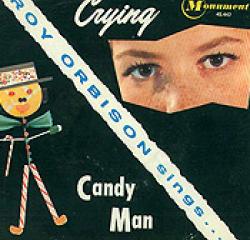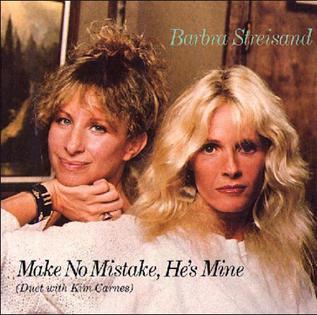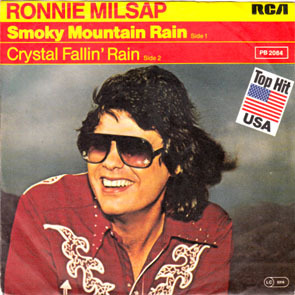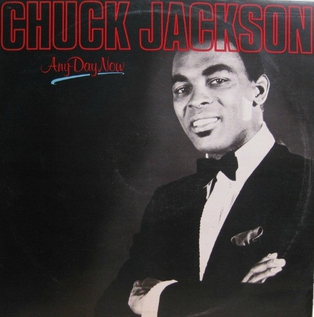
Ronnie Lee Milsap is an American country music singer and pianist.

"Crying" is a song written by Roy Orbison and Joe Melson for Orbison's third studio album of the same name (1962). Released in 1961, it was a number 2 hit in the US for Orbison and was covered in 1978 by Don McLean, whose version went to number 1 in the UK in 1980.
"Pledging My Love" is a blues ballad. It was written by Ferdinand Washington and Don Robey and published in 1954.

"I Can't Stop Loving You" is a popular song written and composed by country singer, songwriter, and musician Don Gibson, who first recorded it on December 3, 1957, for RCA Victor Records. It was released in 1958 as the B-side of "Oh, Lonesome Me", becoming a double-sided country hit single. At the time of Gibson's death in 2003, the song had been recorded by more than 700 artists, most notably by Ray Charles, whose recording reached No. 1 on the Billboard chart.

"Since I Don't Have You" is a song written and composed by Jackie Taylor, James Beaumont, Janet Vogel, Joseph Rock, Joe Verscharen, Lennie Martin, and Wally Lester. It was first a 1958 hit single for the doo-wop group the Skyliners on the Billboard Hot 100. Country music singer Ronnie Milsap had a hit with the song in 1991. American hard rock band Guns N' Roses also had some success in 1994 with their version of the song which reached the top 10 on the UK Singles Chart.

"Make No Mistake, He's Mine" is a song written by Kim Carnes, recorded as a duet with Barbra Streisand in 1984. The duet was subsequently recorded as "Make No Mistake, She's Mine" by Ronnie Milsap and Kenny Rogers in 1987. Both versions of the song charted.

"Smoky Mountain Rain" is a song written by Kye Fleming and Dennis Morgan, and recorded by American country music singer Ronnie Milsap. It was released in September 1980 as the first and only single from his Greatest Hits compilation album. The single became one of his best-known songs.

"It Was Almost Like a Song" is a song written by Hal David and Archie Jordan, and recorded by American country music singer Ronnie Milsap. It was released in May 1977 as the first single and title track from the album It Was Almost Like a Song. It became one of the greatest hits of his recording career upon its release in 1977.

"(There's) No Gettin' Over Me" is a song written by Walt Aldridge and Tom Brasfield, and recorded by American country music singer Ronnie Milsap. It was released in June 1981 as the first single from the album There's No Gettin' Over Me. Known by many fans by its less grammatically correct title "There Ain't No Gettin' Over Me" — the song's official title appears nowhere in the lyrics — the song became one of Milsap's biggest country hits and his only top 10 pop hit during his recording career.
The discography of American country music singer Ronnie Milsap consists of 30 albums and 79 singles. Since releasing his first album in 1971, Milsap has had 36 number-one hits on the Billboard country chart and sold over 35 million albums. In addition, 26 of his US number-one hits reached number-one on the RPM Top Country Tracks chart in Canada; three songs that did not reach number-one in the US were number one in Canada; and two of his US number-one country hits also topped the US adult contemporary chart. As of 2000, he has recorded 7 gold albums, 1 platinum album, and 1 double-platinum album.

"Any Day Now" is a popular song written by Burt Bacharach and Bob Hilliard in 1962. It has been recorded by numerous artists over the years, including notable versions by Chuck Jackson in 1962, Alan Price in 1965, Elvis Presley in 1969, Scott Walker in 1973 and Ronnie Milsap in 1982. In the lyrics, the singer predicts the imminent demise of a romantic relationship and describes the sadness this will leave.

"Lost in the Fifties Tonight (In The Still of the Night)", a single released by country music singer Ronnie Milsap. It is a medley of "Lost in the Fifties Tonight" written by Mike Reid and Troy Seals and a cover of The Five Satins' 1956 hit "In the Still of the Night".
"I'll Leave This World Loving You" is a country music song written by Wayne Kemp and Mack Vickery. Kemp released it in 1980 on the Mercury Records label. He had previously recorded the song in 1974 for MCA Records, and used this version as the B-side to his 1974 single "Harlan County".
"Prisoner of the Highway" is a song written by Mike Reid, and recorded by American country music singer Ronnie Milsap. It was released in September 1984 as the second single from the album One More Try for Love. The song was later included on one of his compilation albums that was released in 1992; this album was entitled Greatest Hits Vol. 3.

"What a Difference You've Made in My Life" is an inspirational song written by Archie Jordan and first made famous by two artists during 1977: then-teenage Christian music singer Amy Grant and country music singer Ronnie Milsap.

"(I'm A) Stand by My Woman Man" is a song written by Kent Robbins, and recorded by American country music artist Ronnie Milsap. It was released in July 1976 as the second single from the album 20/20 Vision. The song was Milsap's sixth number one on the country chart. The single stayed at number one for two weeks and spent a total of eleven weeks within the top 40. It is an answer song to Tammy Wynette's Stand By Your Man. Backing vocals were provided by The Holladay Sisters.
""Only One Love in My Life" is a song written by R.C. Bannon and John Bettis, and recorded by American country music artist Ronnie Milsap. It was released in May 1978 as the first single and title track from the album Only One Love in My Life. The song was Milsap's tenth number one on the country chart. The single stayed at number one for three weeks and spent a total of 11 weeks on the country chart's top 40.
"Happy, Happy Birthday Baby" is a 1957 song written by Margo Sylvia & Gilbert Lopez. "Happy, Happy Birthday Baby" was originally performed by The Tune Weavers, who had their only hit with this song. Both Margo Sylvia and Gilbert Lopez were members of The Tune Weavers. The single went to number four on the R&B chart and went to number five on the Hot 100. The B-side of "Happy, Happy Birthday Baby, was The Tune Weavers version of "Ol' Man River".
"Making Believe" is a country music song written by Jimmy Work. Kitty Wells recorded a chart-topping version in 1955. The song is on many lists of all-time greatest country music songs and has been covered by scores of artists over the past fifty years, including Thorleifs, Bob Dylan, Johnny Cash, Don Gibson, Roy Acuff, Lefty Frizzell, Wanda Jackson, Connie Francis, Ray Charles, Anita Carter, Dolly Parton, Emmylou Harris, Merle Haggard, Ernest Tubb, Skeeter Davis, The Haden Triplets, Social Distortion and Volbeat. The song is occasionally called "Makin' Believe".

"Sea of Heartbreak" is a song written by Paul Hampton and Hal David and recorded by Don Gibson in 1961. The song reached #2 on the Billboard Hot Country Singles & Tracks chart.













